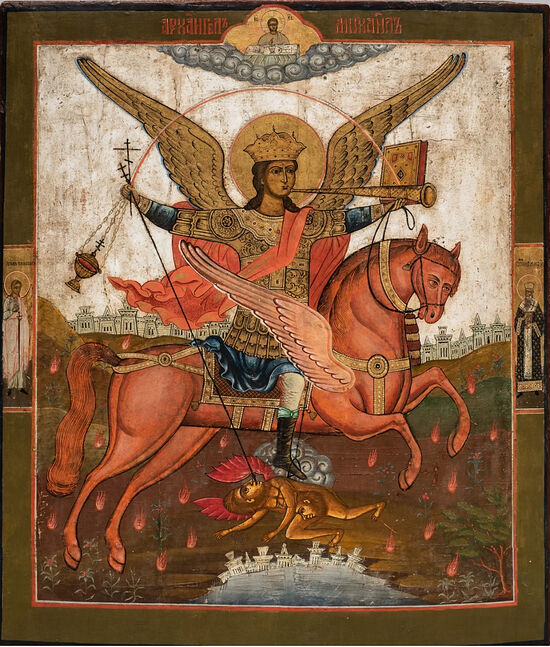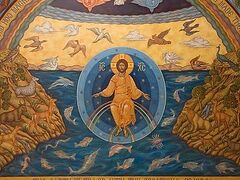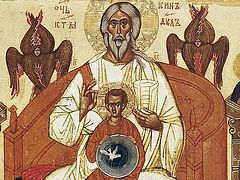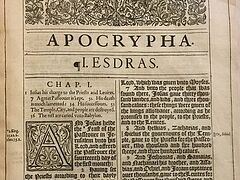We are beginning a study of the book of Revelation by St. John the Theologian. Perhaps it would be useful to ask ourselves: Why should we read and analyze this book?
To answer this question, we have to understand why God gave such a book to the Church.
Christianity is a religion of acute eschatological expectation. The Church always remembers that the world is moving towards its end and the subsequent transformation. Only God knows the times and the seasons (cf. Acts 1:7), but Scripture warns that this time is near. Little children, it is the last time (1 John 2:18), St. John the Theologian wrote already in the first century. Therefore, since the very beginning of its existence, the Church has been “look[ing] for the Resurrection of the dead and the life of the world to come.”
In order for these expectations to be sober and spiritually balanced, God gave the Church a book that forms and directs its eschatological intuitions in the Biblical stream. This book is named after its opening line: Revelation (in Greek: Apokalipsis).
Revelation is the sole prophetic book of the New Testament. It speaks of the spiritual meaning of world history, the future destinies of mankind, the victory of Christ over the devil, and the end of the old and beginning of the new world. The content of the book concerns very serious topics that thinking Christians are called to discuss: What are the temptations of the last time? What to fear and what to be prepared for in these days? What are the signs of the coming of the antichrist and the Second Coming of Christ?
Revelation is like a mosaic in which all the books of Sacred Scripture come together in a beautiful tapestry. Revelation is like a sea into which the streams of various Biblical images and symbols flow. Like a patchwork quilt, Revelation is interwoven with threads from Moses, Isaiah, Ezekiel, Jeremiah, and the other Biblical authors. All the prophecies of the Old Testament find their fulfillment and completion in this work of St. John the Theologian.
Revelation is a very liturgical book. Its liturgical character is revealed in a great number of songs, hymns, praises, and exclamations. Revelation is permeated with worship, which sounds now in Heaven, now in Earth, and sometimes covers all of creation. We need to know the work of St. John the Theologian so as to better under the Liturgy.
There is a persistent myth that it is forbidden to read Revelation in the services. This is not true. To the contrary, the Typikon calls for the reading of Revelation during the services, only, not at Liturgy, but at the All-Night Vigil, at a certain period of the Church year: “Know that from the week of Holy Pascha until the week of All Saints, after the blessing of the loaves, the Acts of the Holy Apostles are read. In the other weeks throughout the year, the seven Catholic [Universal] Epistles of the apostles are read, and the fourteen epistles of the holy apostle Paul, and the Revelation of the holy apostle John the Theologian.”
Obviously, the Typikon calls for the reading of Revelation at the point of the usual teachings at the All-Night Vigil—after Psalm 33, at the transition from Vespers to Matins.
Revelation should be studied because it is a book beloved by the holy fathers. Despite its difficulties, the fathers of the Church regarded it with great reverence. Thus, St. Dionysios of Alexandria writes: “The darkness of this book does not hinder us from being amazed by it. And if I don’t understand everything in it, it is only because of my inability. I can’t be the judge of the truths contained within it and measure them with the paucity of my mind; guided more than faith by reason, I find them only superior to my understanding.” St. Jerome of Stridon wrote about Revelation in the same way: “It contains as many secrets as words. But what am I saying? Every praise for this book will be beneath its dignity.”
Because Revelation is the most mysterious and most difficult-to-understand book of Scripture, many believers are afraid to read it, for fear of misunderstanding. But Revelation is a canonical book of the Bible, and that means the Church recommends that all Christians study it. Blessed is he that readeth, and they that hear the words of this prophecy, and keep those things which are written therein (Rev. 1:3), says the beginning of Revelation.
This book should be read so as not to let our spiritual guard down. Watch therefore: for ye know not what hour your Lord doth come (Mt. 24:42), says Christ.
Archpriest Alexander Sorokin writes wonderfully about the need to study Revelation:
The modern Orthodox Christian, a member of that Church that has already passed through 2,000 years of history in anticipation of the imminent end of history, must be aware of a twofold spiritual-theological task: to firmly know and understand what Christian apocalyptic literature heralds, standing at the very font of Christian evangelization, and how this proclamation retains its enduring meaning through the centuries and millennia of various historical epochs. It’s impossible and unnecessary to resurrect the initial apocalyptic disposition (all such resurrections look spiritually unsober, if not psychologically suspicious), but it is necessary to cherish the apocalyptic vision of history as having a purpose, meaning, and culmination.
It’s a pity that some people find only one interesting thing in the book of Revelation: 666 and the antichrist. Ask anyone who loves to philosophize about the “seal of the beast” what else they remember from Revelation and the answer will be silence. But Revelation is a very vivid message, entirely directed towards the glorious Second Coming of Christ. Even so, come, Lord Jesus! (Rev. 22:20)—this is the main message of this remarkable work of St. John the Theologian.
Based on the works of the Church Fathers and ecclesiastical writers, we will try to find the “keys” to discover the main meanings of this amazing, bright, interesting, and—most importantly—joyful book.





